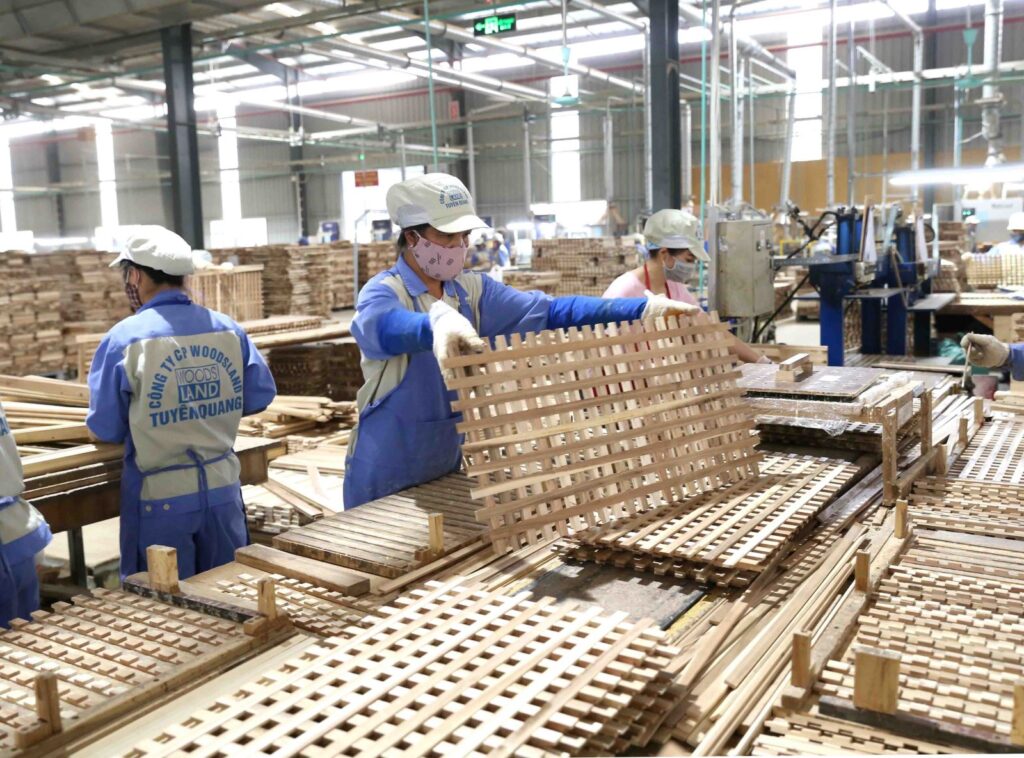Exports of wood and wood products made a strong breakthrough in January, reaching $1.49 billion, a 72.5% increase over the same period in 2023.
Vietnam has set a target of US$16 billion in wood and wood products exports in 2024, up 20% from 2023, based on promising prospects from the US and European markets, the Ministry of Agriculture and Rural Development reported.
| Production stages of wood products for export to the EU market at Woodsland Tuyen Quang JSC. Photos: VNA |
According to Tran Quoc Manh, deputy chairman of the Vietnam Handicraft Exporters Association, strong import growth will accelerate from the third quarter of 2024 as inflation in the two major markets, the US and Europe, has declined and supply and demand have rebalanced.
After a period of shrinking production and even closure due to lack of orders, some companies have secured export contracts for the whole of 2024.
According to Le Ha Trong Chau of Duc Thien Co, Ltd, they have orders booked until the end of June 2024, the Nguoi lao dong newspaper reported. The US is the company’s main export market, with 10-15 containers per month and revenues of $1-1.2 million.
Minh Phat 2 Co., Ltd. has obtained export orders until the end of the first quarter of 2024. Another company, Saigon Trade and Production Development JSC (SADACO), has acquired stable orders from the US and Europe.
In particular, in the European market (EU), Vietnamese exports of wood and wood products to the Netherlands show significant growth, almost doubling compared to the same period in 2023.
According to the General Department of Customs, Vietnam’s exports of wood and wood products to the Netherlands reached $9.2 million in January, an increase of 5.1% year-on-year and 93.8% year-on-year.
This rise can be explained by the shortage of fuel supplies from Russia, which has led the Netherlands to increase its demand for compressed wood pellet imports from various countries, including Vietnam, according to the Vietnam Handicraft Exporters Association.
The Netherlands is currently one of the EU‘s largest importers of Vietnamese timber. However, the country is also a demanding market with many regulations and high standards for goods. Therefore, meeting these standards is crucial to boosting wood and wood products exports to this market, the association said.
Regarding the US market, Nguyen Ngoc Huong, deputy director of Kim Gia Trading and Manufacturing JSC (a wood veneer exporter to the US), believes that despite high inflation and tight consumer spending, this market still has potential. In 2023, instead of focusing on a low-price strategy like other businesses, Kim Gia actively approached customers by developing appropriate products.
He explained that buyers in the US market are still buying white meranti veneer at prices of $360 or $370 per ton. However, it is important to find end users and avoid selling through Chinese traders to increase profits.
“We took all these factors into consideration to enter the California and New York markets in the US,” Huong told VnEconomy.
To increase exports to the US and other markets, the Ministry of Industry and Trade is advising local companies to continue research and development in many markets, especially investing in improving production capacity and product quality to meet technical standards and sustainable development regulations.
Towards sustainable development
 |
| Production of curved plywood for export at the Nhat Nam Plywood factory in An Dien commune, Ben Cat district, southern Binh Duong province. |
In the first month of 2024, exports of wood and wood products made a strong breakthrough, with a growth rate of 72.5% compared to the same period in 2023. Vietnam’s wood export sector has shown signs of recovery since the last few months of 2023. According to the Ministry of Industry and Trade, exports of wood and wood products have recorded positive growth since the fourth quarter of 2023, and the trend is expected to continue this year.
Although revenues from these exports reached nearly $1.5 billion last month, Vietnam’s timber industry also faces some direct challenges to its sustainability. These include risks associated with imported wood materials, EU regulations to combat forest destruction and low carbon emission requirements for wood products. In addition, the conflicts in the Red Sea have led some shipping companies to announce the suspension of shipments or changes in schedules, resulting in increased freight costs, the ministry said.
According to Tran Ngoc Liem, Director of the Ho Chi Minh City Branch of the Vietnam Chamber of Commerce and Industry (VCCI HCMC), wood and wood products companies need to find new markets and diversify traditional and non-traditional sales channels.
Tran Quoc Manh of Sadaco suggests that as well as seeking new customers, companies should proactively switch to eco-friendly materials and recycled resources to cut costs and meet new customer demands.

 Tiếng Việt
Tiếng Việt




